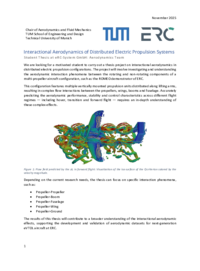Interactional Aerodynamics of Distributed Electric Propulsion Systems
- Institute
- Lehrstuhl für Aerodynamik
- Type
- Semester Thesis
- Content
- theoretical
- Description
We are looking for a motivated student to carry out a thesis project on interactional aerodynamics in distributed electric propulsion configurations. The project will involve investigating and understanding the aerodynamic interaction phenomena between the rotating and non-rotating components of a multi-propeller aircraft configuration, such as the ROMEO demonstrator of ERC.
This configuration features multiple vertically mounted propulsion units distributed along lifting arms, resulting in complex flow interactions between the propellers, wings, booms and fuselage. Accurately predicting the aerodynamic performance, stability and control characteristics across different flight regimes — including hover, transition and forward flight — requires an in-depth understanding of these complex effects.
Depending on the current research needs, the thesis can focus on specific interaction phenomena,
such as:- Propeller-Propeller
- Propeller-Boom
- Propeller-Fuselage
- Propeller-Wing
- Propeller-Ground
The results of this thesis will contribute to a broader understanding of the interactional aerodynamic effects, supporting the development and validation of aerodynamic datasets for next-generation eVTOL aircraft at ERC.
Work packages:
1. Literature review and familiarization:
Conduct a literature review on interactional aerodynamics of distributed propulsion systems. Familiarize with the theoretical background, relevant flow phenomena, and CFD methodologies.
2. CFD simulation of selected configurations:
Build a parametrized geometry (e.g., based on ROMEO components) and perform unsteady CFD simulations using RANS/URANS with actuator disk/line methods to capture key interaction effects.
3. Analysis and interpretation:
Analyze aerodynamic field data and integral forces/moments. Quantify the influence of geometric and operational parameters and derive trends or correlations for inclusion in aerodynamic datasets.
4. Report and documentation:
Write a detailed report documenting the research findings, including the experimental procedures, data analysis, and software development.If you are interested in this opportunity, please send your application including a CV, a brief statement
of motivation, and a transcript of records to Jonathan Pflüger:
pflueger@erc-system.com- Requirements
Requirements:
- Student in a relevant field such as mechanical engineering, aerospace engineering, or physics
- Familiarity with CAD and CFD software (preferably Siemens NX and Ansys Fluent)
- Basic knowledge of aircraft and propulsion aerodynamics
- Ability to work independently and collaborate with a team
- Good written and verbal communication skills in English
- The study project is expected to take approximately 3-6 months and will be carried out at
eRC-System GmbH in the Aerodynamics team. The successful candidate will receive guidance and support from experienced researchers.
- Possible start
- sofort
- Contact
-
M.Sc. Jonathan Pflüger
pfluegererc-system.com - Announcement
-
